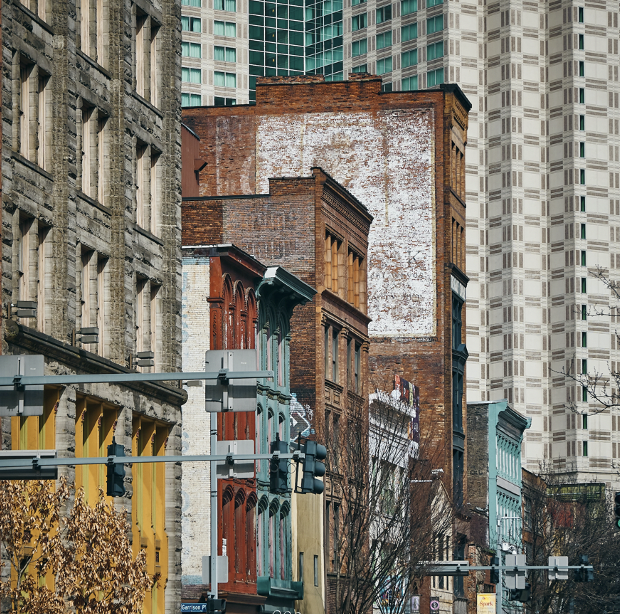By Natasha Patel, Staff Writer

On May 12, 2022, the Builders Association of Metropolitan Pittsburgh (“BAMP”), a Pennsylvania non-profit trade association, filed a complaint in the U.S. District Court for the Western District of Pennsylvania against the City of Pittsburgh claiming that the City’s inclusionary zoning ordinances are unconstitutional and violate due process and the City’s Home Rule charter.[1]
City Council approved this zoning ordinance in April 2022 and an inclusionary zoning bill was signed into law by Mayor Ed Gainey in May 2022.[2] The zoning ordinance was first introduced through a pilot program in Lawrenceville, before the Mayor’s bill expanded it to Bloomfield and Polish Hill.[3] The ordinance requires that new developments or significant improvements to existing buildings of twenty or more units designate “at least 10 percent for low-income residents.”[4] This requirement would last at least thirty-five years. [5]
BAMP alleges in its complaint that the ordinance will “disincentivize developers from investing in the City’s neighborhoods and residents due to the exponentially-increased development costs, thereby limiting the supply of newly constructed units, increasing general housing prices, and ultimately limiting housing opportunities of moderate-income families.”[6] Furthermore, the complaint alleges that the ordinance would impose an “uncompensated taking in violation of the Constitution’s Takings Clause and that Pittsburgh is imposing unconstitutional conditions on their ability to obtain building permits.”[7] In other words, BAMP argues that this law is an illegal taking of private property.
Whereas, the City’s efforts are focused on preserving affordable housing in rapidly developing areas.[8]According to Regional Housing Legal Services, in Pittsburgh “40% of residents are cost-burdened, spending more than 30% of their income on housing–and one in four are paying more than half their income on a place to live.”[9] There is an estimated shortage of 8,200 housing units for households at or below 30% of the area median income.[10] In Polish Hill median home values have grown exponentially from $70,000 in 2015 to $210,000 in 2018.[11] The city aims to combat these rising costs with this ordinance.[12]
With increasing rent and housing costs, an estimated 866 jurisdictions all over the country have passed some form of inclusionary zoning law.[13] Yet the constitutionality of these policies is one the Supreme Court of the United States has declined to address.[14] Over the years the Supreme Court has declined to review California Building Industry Association v. City of San Jose (2016), 616 Croft Ave. v. City of West Hollywood (2017), and Dartmond Cherk, et al. v. Marin County, California (2019).[15] Although it is in its beginning stages, the suit against the City of Pittsburgh has the potential to work its way up to the Supreme Court.
On August 15, 2022, the City of Pittsburgh filed a Motion to Dismiss.[16] In addition, third parties such as the Fair Housing Partnership of Greater Pittsburgh, Lawrenceville United, the Bloomfield Development Corporation, Polish Hill Civic Association, and Hill District Consensus Group have all filed Motions to Intervene in this matter.[17]
[1] https://www.documentcloud.org/documents/22014711-bamp-v-city-of-pittburgh-complaint
[2] https://triblive.com/local/lawsuit-alleges-pittsburghs-inclusionary-zoning-ordinance-is-unconstitutional/
[3] https://www.jurist.org/news/2022/05/pittsburgh-builders-association-files-lawsuit-claims-inclusionary-zoning-law-is-unconstitutional/
[4] https://www.jurist.org/news/2022/05/pittsburgh-builders-association-files-lawsuit-claims-inclusionary-zoning-law-is-unconstitutional/
[5] https://www.jurist.org/news/2022/05/pittsburgh-builders-association-files-lawsuit-claims-inclusionary-zoning-law-is-unconstitutional/
[6] https://www.documentcloud.org/documents/22014711-bamp-v-city-of-pittburgh-complaint
[7] https://reason.com/2022/05/13/is-americas-primary-affordable-housing-policy-unconstitutional/
[8] https://www.pghcitypaper.com/pittsburgh/neighborhood-advocates-back-city-on-inclusionary-zoning-lawsuit/Content?oid=22278192
[9] https://www.lawyerscommittee.org/pittsburgh-neighborhood-organizations-head-to-court-to-defend-inclusionary-zoning-affordable-housing-and-diverse-neighborhoods/
[10] Id.
[11] https://triblive.com/local/pittsburgh-council-votes-to-expand-inclusionary-zoning-to-bloomfield-polish-hill/
[12] Id.
[13]https://www.urban.org/sites/default/files/publication/99647/inclusionary_zoning._what_does_the_research_tell_us_about_the_effectiveness_of_local_action_2.pdf
[14] https://www.bloomberg.com/news/articles/2019-10-03/inclusionary-zoning-may-face-a-supreme-court-test
[15] Id.
[16] https://advance.lexis.com/document/?pdmfid=1519217&crid=0f4cae9a-63ee-4984-8166-c4024065ca5a&pddocfullpath=%2Fshared%2Fdocument%2Fdockets%2Furn%3AcontentItem%3A65F2-K7F1-J9YR-S240-00000-00&pdcontentcomponentid=343397&pdteaserkey=sr1&pditab=allpods&ecomp=4d2wk&earg=sr1&prid=1c161357-daf1-4c83-9b52-03924c5e1553
[17] Id.